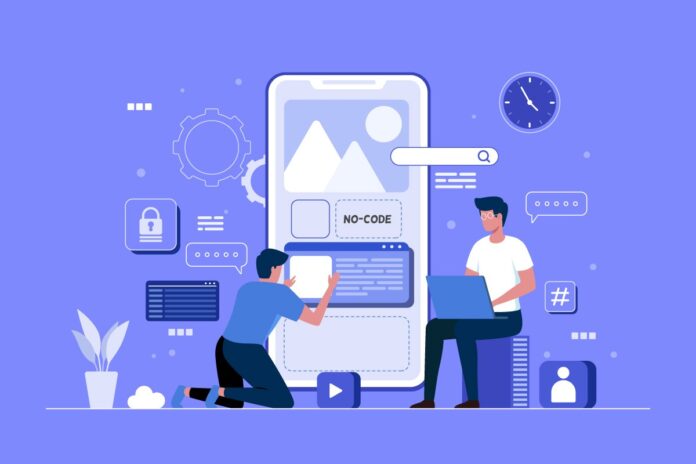
No-code app builders are an excellent way to create beautiful apps without knowing how to code. Many companies, especially startups and small businesses, utilize these kinds of tools to make their official apps quickly, efficiently, and without spending a fortune on hiring a programming team to do it for them.
Of course, there’s a reason many people still prefer coding their own applications, mainly due to the flexibility it provides.
Here we’ll talk about the advantages and disadvantages of using no-code builders to help you make the best choice for your company.
So, without any further ado, let’s get right into it!
The pros
1. Doesn’t require deep knowledge of coding and programming.

Learning to code functional, professional-looking apps can take years of studying and practical experience. Even the most experienced coding professionals frequently find bugs and issues in their own code, all of which can be incredibly time-consuming to fix. No-code app builders, on the other hand, require minimal knowledge of programming to work. They’re based on pre-coded templates that are bug-free and ready for use whenever you want!
If you’d like to build your first app, but have no experienced programmers on your team, no-code app builders are the perfect choice for you. It’s much cheaper and less time-consuming than having to outsource actual programming specialists for your project.
2. It takes less time than working with a programming agency or freelancers.
Explaining your needs to a programming specialist and waiting until they’ve created something that suits your company can be quite time-consuming. Besides that, you’ll need to find someone who’s experienced enough and whose services fit your budget, which can prove to be quite complicated after a while.
No-code app builders remove the need to search and communicate with programmers, which simplifies the entire process in a major way. You can just hop onto the program yourself, use some pick and drag tools, and you’ll have a functional app ready in no time!
Of course, you have to make sure to choose a reliable app-builder to ensure you get exactly what you want out of the software. Explore different options until you’ve found something that fits your needs and preferences properly.
3. Easier app management.

Debugging and managing a traditionally-coded app requires using too many of your company’s resources to be done efficiently. Releasing a buggy app can cost you tons of money down the line, especially if its launch ends up being unsuccessful. No-code builders simplify the debugging processes immensely, allowing you to solve app-related issues quickly and without much effort.
All of this will save you large amounts of time, allowing you to focus on other important aspects of the app management such as updating, writing content, and beautifying the interface further.
Overall, no-code and low-code app builders are perfect for small businesses that lack the resources to employ a full-blown app development team for their app-management needs. You can find more reasons why it’s great to have no-code builders for your application management if you click here.
The cons
1. Less flexibility when it comes to app functionalities.
One of the biggest advantages of coding your own app from scratch is the flexibility it can provide. As long as you have relevant expertise at your disposal, you’ll be able to enrich your application with as many features as you need.
Unfortunately, not all no-code builders can compete with this type of flexibility. You’ll be able to pick from pre-made templates and featurettes that can feel quite limiting from time to time. That’s why we recommend you do as much research as possible to ensure that the builder can provide your app with the features you need before you commit to one.
Again, if you’d like your app to have especially complex or unique features, the traditional coding approach might be a better option for you.
2. It can still be difficult to learn.

While creating your first user interface the no-code way is much easier than taking the traditional coding approach, you’ll still have to watch a couple of tutorials to make your app functional. You’ll also need to have at least some technical knowledge to be able to use these programs efficiently.
If you’re not ready to spend a couple of hours learning how the platform of your choice works, you’re probably better off just hiring someone to code your app for you.
Besides, you’ll still need to consult with a graphic designer to make the app work from a marketing standpoint. All of this can be more expensive and time-consuming than hiring an agency to do it for you all at once!
3. Security issues.
With no-code app-building platforms, you’ll have to rely on the service itself when it comes to all of your security concerns. Ensure the platform you choose is trustworthy enough before you commit to it. Switching platforms can be a difficult (and expensive) task you’d rather want to avoid.
So yes, no-code builders don’t allow for flexibility when it comes to resolving security issues. The sensitive data that gets put onto your app might end up being out of your control. If you’d rather deal with security vulnerabilities with your own hands, we suggest you consider coding your app from scratch.
Otherwise, make sure you’ve examined the platform’s built-in security protocols before you start working with it. You don’t want your sensitive data to be hacked, leaked, or stolen, so doing this is of the utmost importance.

The bottom line
No-code builders come with their own pros and cons. Deciding whether it’s for you or not mainly depends on your specific needs and requirements. If you decide to go that route, ensure you’ve done your research beforehand. Many different companies have built their apps via one of these programs and it worked out well for most of them, so there’s nothing to be afraid of!
Overall, we hope our article helped you decide whether no-code is the way to go for your company or not, and we wish you good luck in your app-building process regardless of what you choose to do.








